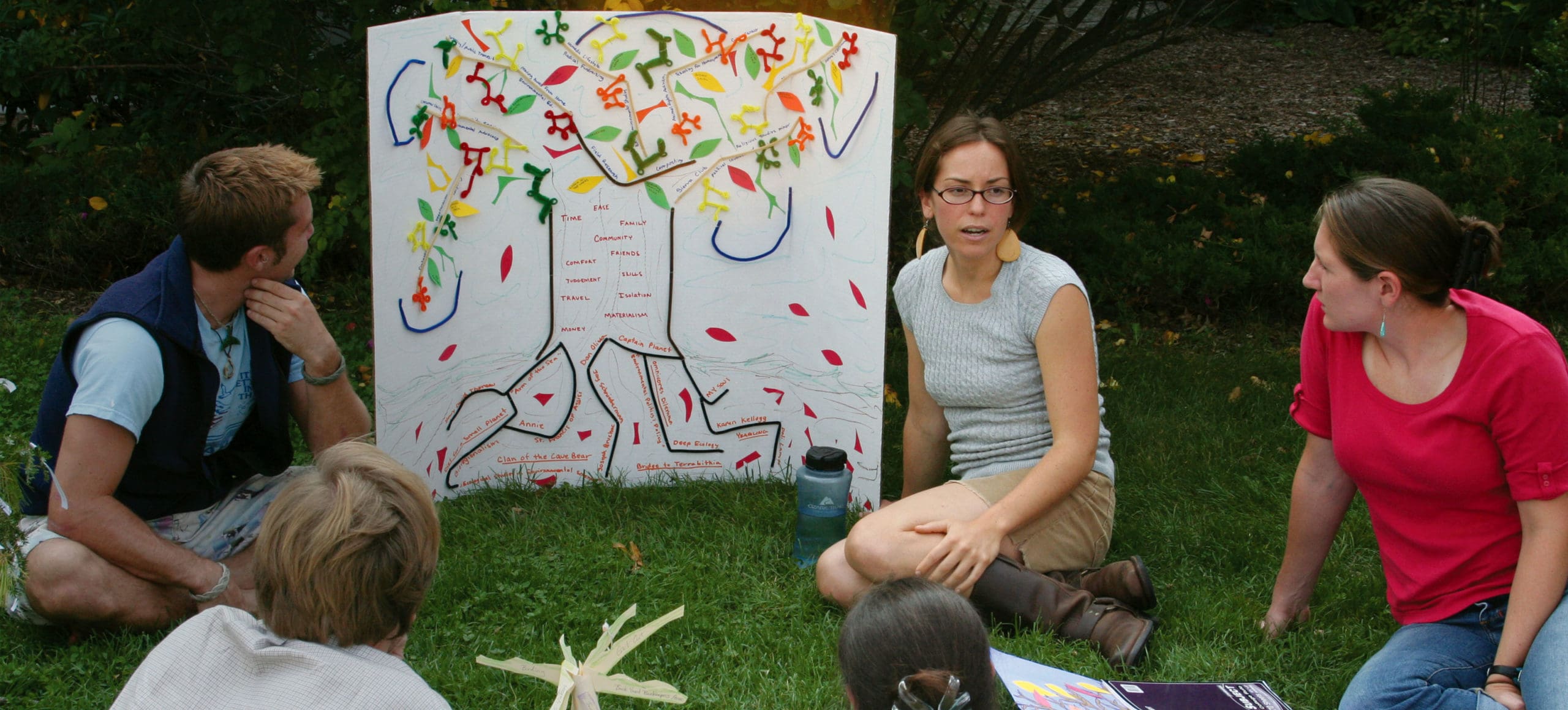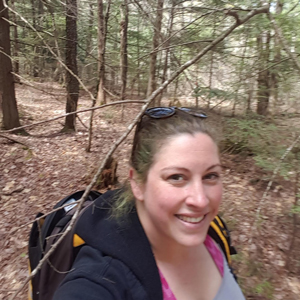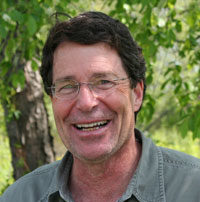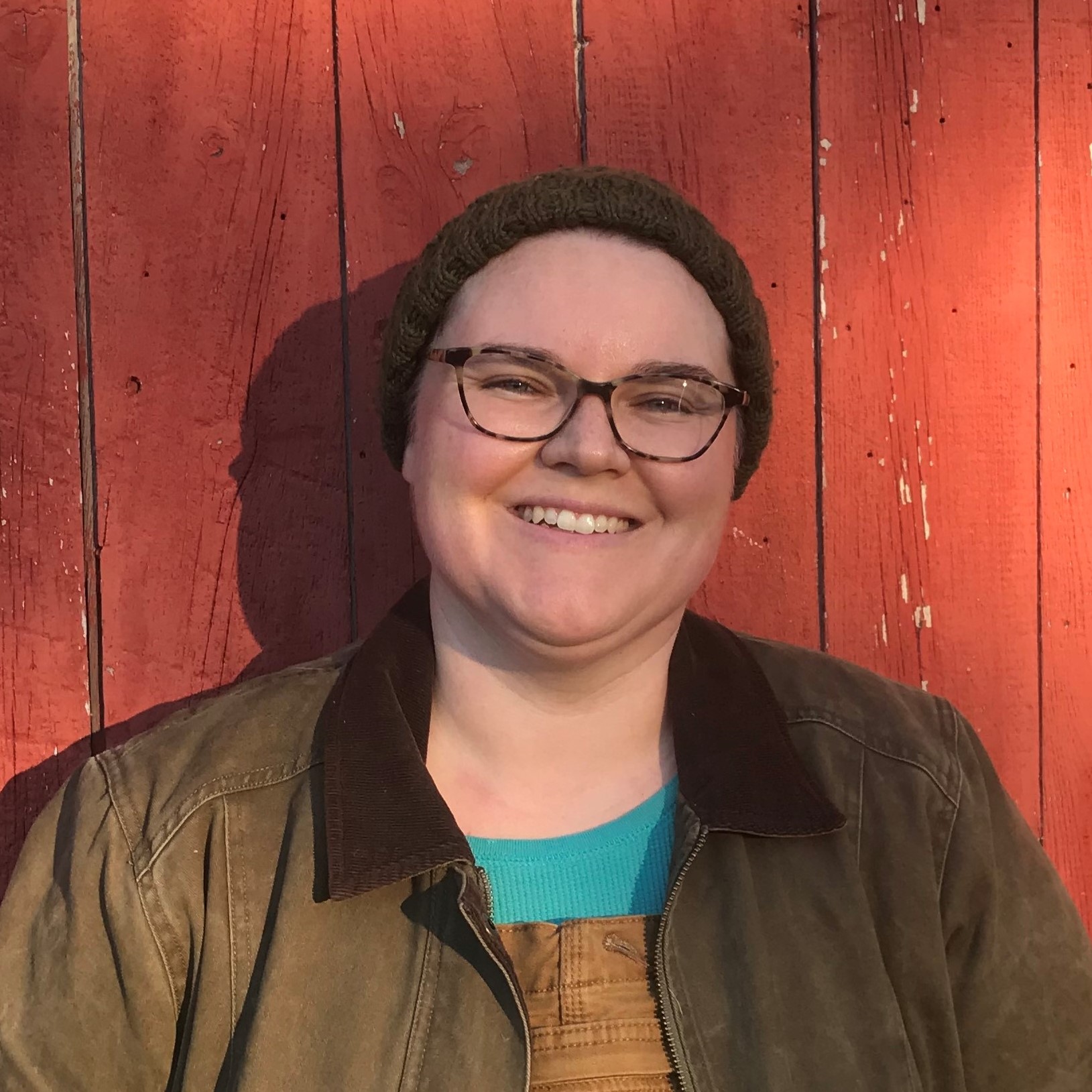MS in Environmental Studies, Self-Designed Studies
Design a degree that meets your professional goals.
Work with an AUNE faculty advisor to strategize and design a program that aligns with the professional path of purpose that you envision for your future. We understand that if your career goals transcend the academic boundaries of our existing Environmental Studies programs, you may consider a more individualized approach. That’s why we work with you to develop a rigorous and rewarding academic framework that is both goal-oriented and structured enough to build the academic depth needed to engage in meaningful practice. If your interests lie at the intersection of disciplines, this option provides the specific customization you’re seeking.
Antioch’s New England campus offers this degree, available online and in person.

“My time at Antioch changed the course of my life and my purpose, teaching me about the complexity, nuance, and vibrancy of living systems.”
Jessica Baum '15
Try Us Out
Wondering if Antioch ES MS is right for you? Prospective students can earn up to three credits in a semester at a highly reduced rate. These credits are transferable into the ESMS degree.
Program Overview
This intersection of disciplines might occur in nature and writing, conservation and communications, agriculture and community, art and environment, ecology and psychology, or another combination of focuses. Those choosing this option must have a predominantly environmental focus, a strong academic background, experience in their proposed field of study, and clearly articulated professional goals.
Consider a sampling of some of our students’ Self-Designed Study titles: Green Marketing, Endangered Species Management, and Biological Conservation, Environmental Advocacy and Journalism, Environmental and Social Sustainability, Environmental Geoscience, Environmental Social Justice Education, Environmental Media Arts, Environmental Writing and Creative Arts, Materials Management & Sustainability Science, Public Understanding of Earth Systems, Sustainable Recreation, Urban Environmental Stewardship, Watershed Management.
This program is affiliated with the National Professional Science Masters Association

Degree Requirements
Master of Science in Environmental Studies
The Master of Science in Environmental Studies is a 36-credit program that can be completed in as little as three semesters and, most typically, in five semesters.
Students in all concentrations select three (9 credits) out of the following four core courses. These courses provide the multidisciplinary foundation for understanding and addressing contemporary environmental issues.
- Applied Ecological Principles (online) or Community Ecology (on campus)
- Leadership for Change
- Earth Systems and Climate Change
- Political Economy and Sustainability
This program is designed for students with strong academic backgrounds in their concentration and significant work experience in the environmental field. Students interested in self-designed studies must submit a program title, description, and course plan to the Director of Self-Designed Studies for approval upon matriculation. The approved plan must then be placed in your academic record in the University Registrar's Office. To earn an MS in Environmental Studies, with a Self-Designed Studies, you must earn a minimum of 36 credits
Concentration courses provide the conceptual and theoretical foundations in your program (6 required credits, 2 specific courses) and (15 elective credits;) provide an opportunity to develop a customized skill set that is relevant to your experience and career goals. Additional credits required include a three (3) credit professional internship and a 3-credit Capstone.
Learning Opportunities
If you are not ready to begin a Master’s Program but are ready to start learning, we have several options available. If you then decide to enter a Master’s Program, you will be able to use these credits or certifications in your degree program.
Certificates
Centers and Resources
Additional Information
You will complete a 3-credit capstone in the form of a master’s project, thesis, collaborative service initiative, or a 2nd professional internship.
Capstone Project (choose one of the capstone options below):
Master’s Project: Typically a descriptive, applied independent research project. Students can address a sustainability challenge in their home community or international area of interest by identifying and developing a solution. Applied GIS projects also can serve as capstones. Recent MS projects include: Proposal for Angola’s Energy Transition: Assessing Conditions and Governance Dynamics; and Analysis of River Corridor Erosion and Soil Loss in the Town of Bernardston, Massachusetts.
Master’s Thesis: Typically an independent empirical research project. Recent MS Theses include: How Is Energy Justice Built Into Community Choice Aggregation? A Comparative Case Study of the Lowell Community Choice Power Supply Program and Cape Light Compact, Massachusetts; The effect of salt marsh restoration on shellfish populations in the Gulf of Maine.
Collaborative Service Initiative: The Collaborative Service Initiative (CSI) is designed to provide an opportunity for outside organizations to work with a team of 2-4 ESMS graduate students who apply their knowledge and skills to an external project that needs to be solved in the community. Projects include developing a place-based education program for a local school system, conducting applied ecological and social research, exhibit and curriculum design, energy and materials management, program/organization evaluation, curriculum and program evaluation, and other consultation projects.
Culminating Professional Internship: After consultation with their Academic Advisor, students may choose to complete a second internship in order to gain more professional experience in their field. Students who choose a second internship should consider how this second professional internship will serve as a launch pad for their post-graduate next step. As a capstone, the experience should be robust, offer significant networking opportunities, and enhance their skill set in new and challenging ways.
Combine your MS in Environmental Studies with Peace Corps service. Through the International Service Program, you can earn credit for your service, apply what you are learning to create positive change across the world and save thousands of dollars on your degree.
You should expect to spend approximately nine hours per week on each 3-credit course and 20-35 hours a week when your practicum and professional internships begin. We encourage you to plan your life carefully to accommodate the increased investment of time and energy in your professional education.
Yes, you can complete this degree fully online. These courses are synchronous and, in some cases, asynchronous. Virtual synchronous course class sessions are offered one evening during the week (Monday-Thursday evenings, ET) and on weekends. You can also choose to take courses with us in person, including field-based courses and campus-based intensives.
Students in AUNE’s Environmental Studies Master of Science (ESMS) program can choose to earn the Professional Science Master’s (PSM) designation for their degree. Learn more at the Professional Science Master’s website.
The program typically takes students five (5) semesters (20 months) to complete if attending full-time . Students who attend part-time can anticipate approximately three (3) years to complete the program. For Fulbright Scholars and those who want an accelerated path, it is possible to complete the degree in three (3) semesters (12 months).
Graduates of our MS in Environmental Studies program are employed in many sectors of environmental work, from private consulting and regulatory enforcement to conservation institutions, formal and informal educational settings, government agencies, advocacy organizations, and the arts.
Faculty Spotlights

Amanda Suzzi-Simmons
Core Faculty, Director

Kelly Drifmeyer, MLS, MM
Research and Instruction Librarian

Michael Simpson, MS, MALS
Faculty Emeritus

Julia D. Gibson, PhD
Core Faculty
Admissions / Cost / Aid
Admission
How to Apply
- Complete the online admissions application, including:
- Essay questions, admissions and program-specific
- Resume/curriculum vitae (CV)
- Non-refundable $50 application fee
- Submit official transcripts from all colleges or universities where you earned a degree or certificate.
- email transcripts to [email protected], or
- mail to: Office of Admissions Antioch University New England 40 Avon Street Keene, NH 03431-3516
- Two letters of recommendation are required, from people who are in a position to evaluate your professional or academic work. The person making the recommendation may not be related to you.
- There are additional requirements for International applicants.
- Interview with a faculty member of the department to which you seek entry if selected. This can be in person, by phone, or via Skype.
Official transcripts should be emailed to [email protected] or mailed to: Office of Admissions Antioch University New England 40 Avon Street Keene, New Hampshire 03431-3516 All application materials submitted become part of an applicant’s file and cannot be returned.
Application Deadlines
Application Deadlines
Antioch University processes applications for most programs on a rolling basis, so we encourage you to apply as early as possible. All application materials should be received in Admissions by the dates listed below. If you have any questions, please get in touch with the Admissions Department.
| Program | Term | Deadline |
|---|---|---|
| MS Environmental Studies (All Concentrations) | Fall | July 15 |
| Spring | December 1 |
Tuition & Financial Aid
A college education is an investment in your future. Let us help you understand the costs and explore the resources available to help make your college education even more affordable. The majority of AUNE students finance their education through some form of financial aid. You may not be sure which federal, state, public, and private aid packages – such as loans, scholarships, and grants—are right for you. Our staff is here to help you so you can focus on what’s most important: beginning your academic program at AUNE.

Start your Antioch Journey
Take your next step - talk to our admissions team to find the right program for you.
